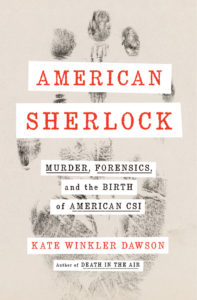
American Sherlock: Murder, Forensics, and the Birth of American CSI. Kate Winkler Dawson. New York: G. P. Putnam’s Sons, 2020. 335 pages. ISBN 9780525539551
Forensic science has become so firmly planted in the popular imagination of what constitutes police investigation that it’s origins in America trace back less than a century.
American Sherlock: Murder, Forensics, and the Birth of American CSI by Kate Winkler Dawson looks at the life of Edward Oscar Heinrich, whose pioneering work in forensic science led him to be dubbed as the American Sherlock of the 1930s. Taking us through his life, Dawson details some of his most famous cases and the methods used to investigate them. Heinrich established many forensic techniques in his lifetime, some with more flaws than others.
Dawson writes in a narrative style, drawing the reader into the story with little details that may or may not have happened. Her storytelling flow keeps the book easy to read; however, some might find the style distracting from the facts of the cases.
American Sherlock begins and ends with one of Heinrich’s most famous cases about a man accused of killing his wife. Dawson takes the reader through the case and Heinrich’s methods, but in the end, she leaves it up to the reader to determine if the outcome was what it should have been. Throughout, readers encounter movie stars, priests, and a number of other fascinating cases. They learn about the beginning of forensic techniques that are still used by police today—including lie detector tests, fingerprint analysis, and ballistics—and how they were used in court to assist in cases. Readers also learn about methods that were used at the time that are no longer considered reliable in forensics, such as handwriting analysis.
Through excerpts of Heinrich’s letters to friends, readers are given a closer and more private view of his personality. He could be scornful of his competitors and their methods, always feeling that his approach was the best. He tried his best to support his family on his income, but it never seemed enough. Heinrich’s personality comes to life in this book through his letters and testimonies, showing readers a man that was both arrogant and admirable and who just wanted to get the correct verdict.
American Sherlock: Murder, Forensics, and the Birth of American CSI is a fascinating look at a generally unknown man in American history. Through the cases discussed, readers learn more about him and his pioneering techniques, as well as his arrogance and the flaws in his professional and personal life. While he never gained great fame (despite all he did to further the science of forensics), this book allows us to look back at his accomplishments. This is a recommended read for anyone interested in crime stories, as well as biographies. Dawson does a great job of combining both in a way that keeps readers’ interest throughout the book. While it does have some details that could be off-putting to those who are a bit squeamish, American Sherlock tends to focus more on solving the cases than the gory details of the investigations.
The CSE Book Club gives members a chance to interact in a more virtual setting while enjoying a book related to scientific editing/publishing. To learn more, visit https://www.councilscienceeditors.org/events/cse-book-club/
Morgan Sorenson is Managing Editor, Neurology® Neuroimmunology & Neuroinflammation, American Academy of Neurology.
